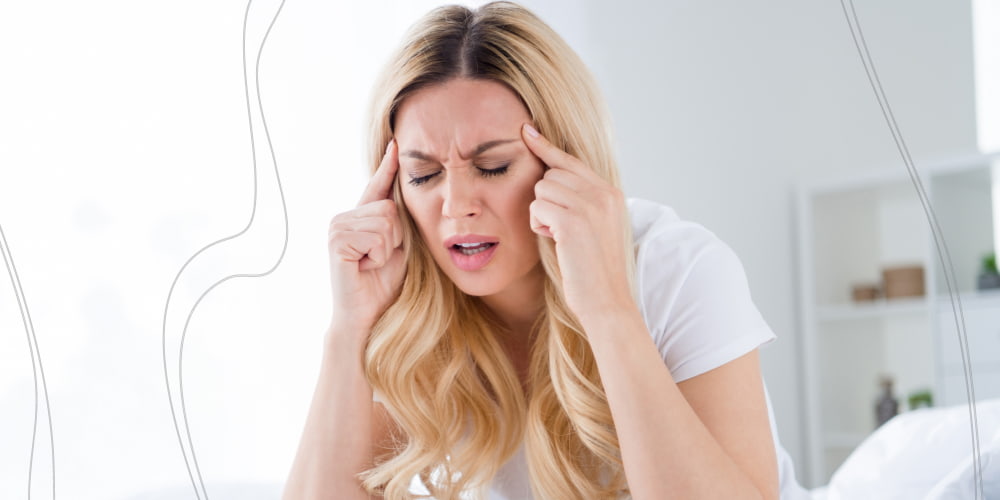Migraine is one of the most common diseases in the top-3 globally, which happens almost to everyone a couple of times per week. Interestingly, migraine is much more common in women, affecting three times as many adult women as men. Even though there is no exact treatment for Migraines, determining the cause of headaches always helps to get rid of them. In most cases, migraine is provoked by a sedentary lifestyle, stress, poor sleep, and abusing nicotine, alcohol, and caffeine, and lasts no more than three days. Stay with us to discover how to cure migraines.
If you have ever felt the pain of migraine, you’re familiar with the features of an attack coming on intense pain, sensitivity to light or sound, variable mood, and maybe slight nausea – what can be worse? These symptoms act as signals making you aware that it’s coming, but you wonder, how long can a migraine last? When will you be able to come back to your routine?
What happens if a migraine is not treated
You should realize that you should treat migraines seriously as if left untreated, your health can worsen over time. Pain can shift from one side of your head to the other, or it can affect the front, or the back of your head, or feel like it’s affecting your whole head. It is recommended to see the doctor if you recognize new, unusual headaches, if it is happening in old age, or after your head is injured. Check out the info below to discover powerful tips on how to cure migraines at home.
Migraine duration
How long can migraines last? A typical migraine attack can last from four hours to 72 hours—but can vary widely. Migraine attacks occur in phases. It can be helpful to recognize the first stage—when a migraine attack is coming on — so you can take medication as recommended by your healthcare provider.
Not every phase occurs during every attack. Keeping a migraine journal (on paper or with an app) and taking detailed notes of symptoms and times can help you and your physician find patterns and establish an effective treatment plan.
What is the root cause of migraines?
Although the leading cause of migraines is a genetic basis, some factors can provoke migraine attacks.
- Stress or anxiety
- Hormonal changes
- External factors which affect sense organs
- Poor sleep
- Environmental changes, including weather
- Passive lifestyle
- Food triggers including alcohol, chocolate, aged cheeses, cured or processed meats
- Missing meals
Check out the info below to get familiar with the four migraine stages and their durations, which will help you determine your health condition and find a solution.
Four stages of Migraines explained
- Prodrome. Scientifically known as the preheadache condition, it comes before a migraine attack. The duration of the prodrome can vary from a couple of hours even to several days. You should take some drugs, try to ignore the stress in the quiet and darkroom to combat disease on its first stage. Remember to avoid migraine triggers that can provoke forming a Migraines attack. We want to highlight that pain can run together with the feeling of depression or irritability, extreme sensitivity to light and sound, Insomnia, and muscle weakness between prodrome symptoms.
- Aura. How long can the second stage of the migraine last? The duration of this phase can last from a couple of minutes to a whole hour and appear before a headache. This phase seems to be uncommon, so in your case, it can be missing. A list of symptoms, which can help you to determine the Aura: blurry vision and even its loss, flashing and shimmering light, seeing geometric patterns, spotted images.
- Headache. The third stage of a migraine can be determined by pain on one or both sides of the head. The degree of pain varies from person to person, as some may have mild pain, and it may be devastating for others. Besides, pain can run together with nausea, sensitivity to noise, strong smells, light, and inability to sleep. You can recognize the headache phase by the extreme reactiveness to external factors.
- Postdrome. The last and the most common stage of migraine, which comes after the attack of a migraine, feels like a hangover. Talking about the characteristic features of that phase, it can run without pain, but patients usually don’t feel comfortable at all. The last migraine stage can be accompanied by body aches, dizziness, concentrating troubles, and sensitivity to harsh light.
How to cure migraine
- Hideaway from harsh light and loud noise. Rest in a dark, quiet room, and try to sleep with your favorite book or calming music.
- Stay hydrated. As you can get, dehydration can be a leading cause of migraines, which you should get rid of. Remember to drink enough amount of water every day,
- Determine your caffeine dose. Although caffeine may act as a cause of migraines, a moderate amount can treat various headache types. Abusing caffeine can become the cause of headaches, but after determining your best dose, it can help you to get rid of the pain.
- Put your phone away. Let your eyes rest, and try to get rid of gadget addiction.
When to worry about a headache
The headache symptoms mentioned below may act as signals to stop wasting your time and make an appointment with a specialist today.
A sudden, new, severe headache that comes with: weakness, dizziness, sudden loss of balance or falling, numbness or tingling, or can’t move your body. The trouble with speech, confusion, seizures, personality changes, or inappropriate behavior.
How long can migraine last? The length of time a migraine attack lasts can individually differ, but according to the National Headache Foundation, we know that most migraine attacks last 4 to 72 hours.












Please, leave your review
Write a comment: